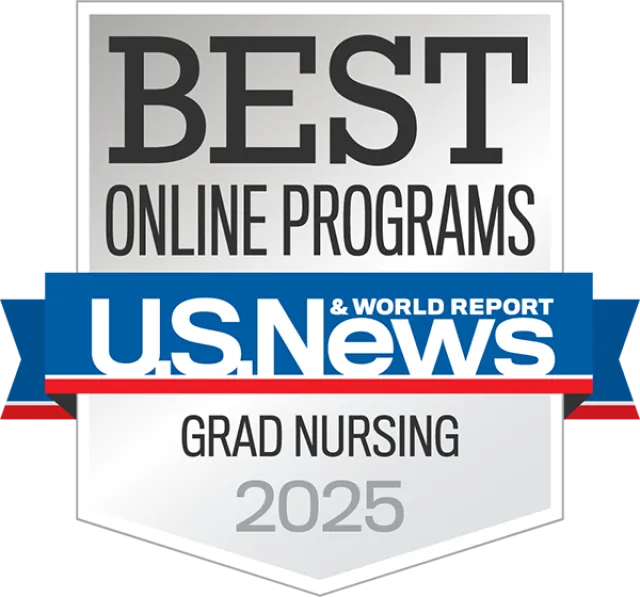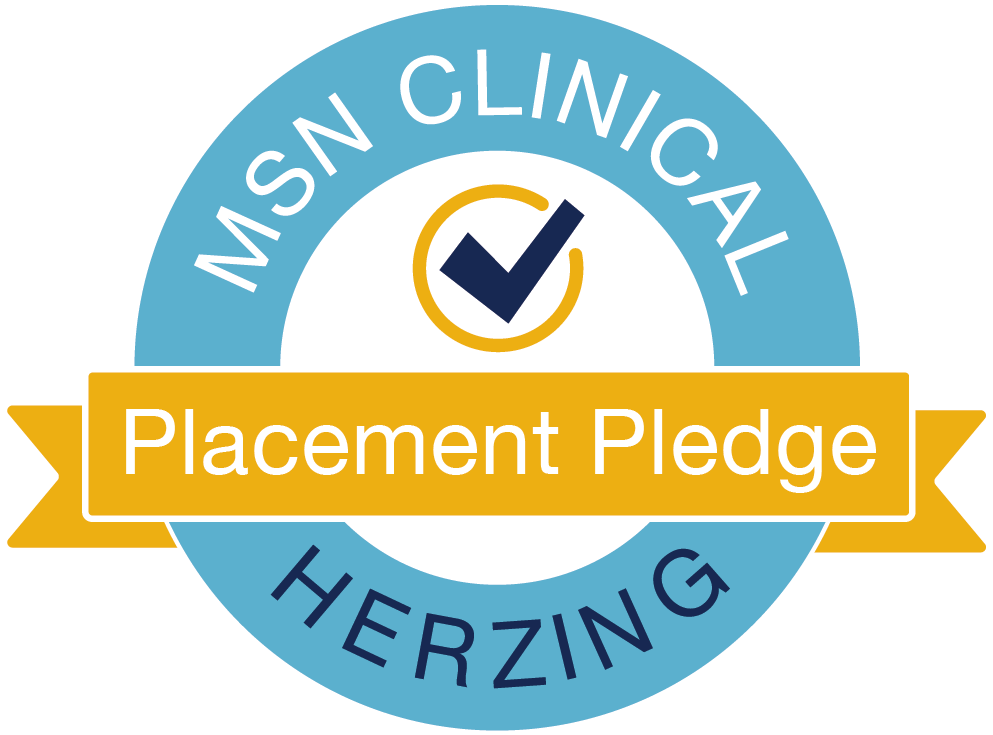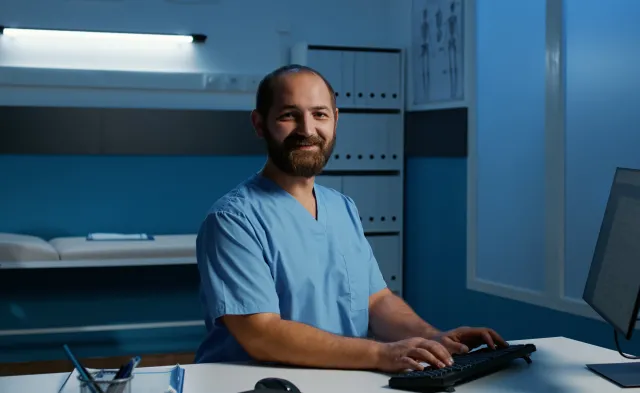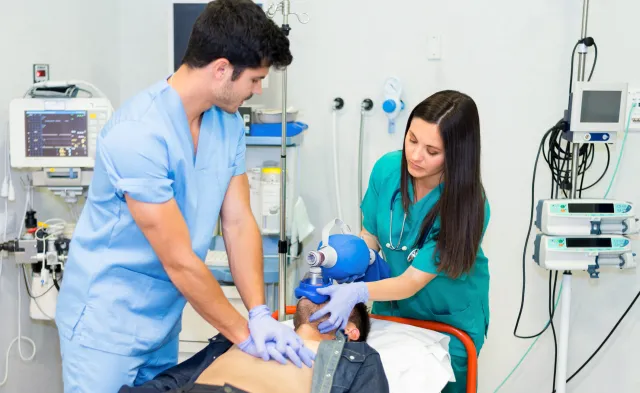Take your next career step with Herzing
| Accreditation | CCNE accredited,1 Accredited by the Higher Learning Commission |
|---|---|
| Transfer credit | Transfer up to 12 approved credit hours |
| Our pledge | We pledge your clinical placement |
| Immersion Exp. | 180-hour, 16-week immersion experience to prepare for your first job |
| Format | 100% online classes with 540 clinical hours across the lifespan: every experience counts |
| Dual credit | Earn dual credit towards a Doctor of Nursing Practice (DNP) |
| QuickPaths | Transfer credit, stackable credentials, and adaptive learning technology build a faster pathway to a higher education with Herzing University |
Learn More Today!

Ranked by U.S. News & World Report as one of the best online graduate nursing programs in 2025
Overview: Online Post Master's PMHNP Program
The Post Master's Certificate in Psychiatric Mental Health Nurse Practitioner is a 33-credit post-graduate program which prepares you for a career as an PMHNP. The online certificate program provides students with fundamental knowledge and skills in advanced pathophysiology and pharmacology, counseling and psychotherapy, advanced psychopharmacology and health promotion, and much more.

Career-focused curriculum
Discover the crucial knowledge and skills required to succeed in your work and build a foundation for continued career growth.
Flexible schedule
We work hard to help you maintain school-life balance, striving to be as flexible as possible for busy non-traditional students.
Virtual services
Access to extensive virtual services, including academic advising, tutoring, support services, technical support and library services.
Lifelong support
We support your ongoing career advancement by providing comprehensive, personalized student services with lifelong career coaching.
Rolling admissions
No application deadlines to worry about. Apply when you’re ready and prepare to get started soon.
Post Master’s PMHNP program classes & curriculum details
The post master’s psychiatric mental health nurse practitioner program provides students with the academic knowledge, skills and expertise to apply for certification as a PMHNP. Classes include core MSN courses, specialty concentration courses and clinical courses. Upon graduation you’ll be qualified for the Board Certified PMHNP (PMHNP-BC) exam from the American Nurses Credentialing Center (ANCC).
Connecting with patients virtually and providing remote care is more important than ever. Our curriculum provides instruction in the principles of telehealth, including the use of appropriate technology, provisions for coding and reimbursement, and the legal and ethical implications of remote patient encounters.
All classes are delivered online with an additional 540 hours of clinicals, including both in-person and virtual/remote experiences; 180 hours of which will be an immersion experience to best prepare you to practice as a PMHNP.
| Program | Months i | Semester Credits |
|---|---|---|
| Post Master's Certificate Psychiatric Mental Health Nurse Practitioner (PMCPMHNP) | 20 | 33 |
i. Average number of months for students to complete program.
Required Direct Care Courses
All courses, 9.00 semester credit hours, are required.
Required Specialty Courses
All courses, 24.00 semester credit hours, are required.
Clinical Proficiency Exam and Policy
The following modules are 0.00 semester credit hours associated with the policy outlined above. Students are required to take as co-requisite module along with NU 611, NU 642, NU 664 or NU 671, depending on the program of study. Module Number Module Name Semester Credit Hours NSG 0600 Clinical Proficiency Module 0.00 NSG 0600R Clinical Proficiency Remediation Module (if needed) 0.00
Tuition & Cost
Tuition & Cost
The cost of tuition for the post master's PMHNP program is $770 per credit.
You can potentially earn even greater savings by transferring credit from prior college coursework, applying for financial aid, or potential partnership opportunities through your employer.
Our goal is your career advancement. That’s why we are always working to improve our curriculum and processes to make our program as affordable as possible while preparing you best for success in your work.
Scholarships & Financial Aid
You may be eligible for multiple scholarships and grants, both through Herzing University and several national scholarship websites.
Military/Veteran Discounts
Veterans, Active Duty U.S. Servicemembers, and spouses may qualify for a 10-20% tuition discount.
Post Master’s PMHNP program enrollment requirements
Enrollment in the post master’s certificate nursing program is open to registered nurses who:
- Hold a graduate degree in nursing from an accredited university or college (such as a master’s or doctoral degree)
- Hold a current, active and unrestricted license as a registered nurse in the state in which they live (Note: Holding a multi-state, compact state license and being a resident in a compact license state will be deemed to have met this requirement).
Every experience counts.
Herzing University integrates an “Every Experience Counts” experiential learning approach in the 540-hour clinical component of our post master's PMHNP program. We believe the best preparation for an advanced practice role is real, prescriptive learning through every day experience.
Earn clinical credit hours for unique nursing experiences—either direct patient care in your community or telemedicine/virtual care. Examples of potentially eligible activities include:
- Grief counseling for patients and families in hospice
- Assistance with group therapy in a mental health institution
- Providing mental health education to inmates in a correctional facility
- Interviewing patients in a crisis stabilization unit
- Assessment of psychiatric patients in the emergency room
If you discover an opportunity to further develop your skills as a PMHNP you may apply for credit towards your total clinical hours.
Build your career foundation from a variety of instructive and rewarding nursing experiences. Our certificate program makes it possible.
Your clinical placement is our pledge.
We understand securing clinical placement as part of the post master's PMHNP program is one of the biggest concerns students face. At Herzing, we offer guidance and support through our step-by-step Clinical Guidance Process to ensure you can get the clinical practice experiences you need.
As a Herzing student, we’ll encourage you to find your own preceptor and clinical sites as there are many benefits to doing so. However, we provide extensive support should you find difficulty along the way. With Herzing, you are never on your own.
Because of our strong relationships with healthcare providers across the U.S. and our comprehensive Clinical Guidance Process, we are confident in our ability to help you find clinical placement. So much so that if you are unable to find a clinical site on your own, we pledge to step in and help you secure clinical placement.*
* Subject to terms and conditions outlined in the enrollment documents.

Help patients become whole as a holistic healthcare provider



Psychiatric mental health nurse practitioners are qualified to diagnose and treat common mental illnesses within their scope of practice, including bipolar disorder, substance abuse disorders, schizophrenia, depression and anxiety.
What does a typical PMHNP do?
- Psychological consulting (psychotherapy)
- Prescribe medication and monitor its effects
- Work in community clinics, private practice, hospitals and more
- Instruct patients on an array of coping skills
- Perform patient care like a detective, uncovering information to solve complex psychological issues
How can I advance my career? After graduating with a PMHNP certificate, Herzing students can also elect to pursue a post master’s FNP certificate, or a certificate in nursing education to continue expanding their professional emphases.
Job Outlook
The demand for PMHNPs is expected to grow:
- The National Center for Health Workforce Analysis estimates the demand for psychiatric nurse practitioners will grow 18% from 2016-2030.
- The Bureau of Labor Statistics projects employment of all nurse practitioners to increase 40% from 2024-2034, much faster than the average across all U.S. occupations.*
Earn the credential you need to join a highly rewarding occupation expected to be in high demand in the recent future.
Waived Enrollment Fee
Discover the educational pathway designed to maximize your career potential. Reach for greater heights with Herzing University.
Faq
Frequently Asked Questions
Didn't find the answer to your question? Send us an inquiry and we will be happy to answer all your questions!
There is a difference between being licensed and certified. Becoming a certified PMHNP shows employers you are capable of patient care in a psychiatric setting. Licensure determines if you are legally allowed to practice in your state of residence. Employers may require board certification before hiring a PMHNP even if practicing without certification is legally permissible.
Each state has their own requirements for licensure. You will need to find the requirements from your state’s board of nursing.
We strongly recommend getting certified after graduating with your degree. You’ll be in the best position to find a great job and follow your career path in nursing.
A post master’s certificate (PMC), also referred to as a “post-graduate” certificate, is designed for nurses who hold a Master of Science in Nursing (MSN) degree and seek additional certification in a separate field.
Herzing University offers several post master’s certificates for MSN-prepared nurses looking to transition in or out of clinical-based practice:
- AGACNP - Adult Gerontology Acute Care Nurse Practitioner (program length: 20 months)
- AGPCNP - Adult Gerontology Primary Care Nurse Practitioner (program length: 20 months)
- FNP - Family Nurse Practitioner certificate (program length: 16-20 months)
- NE - Nursing Education certificate (program length: 8 months)
- NLA - Nursing Leadership & Administration (program length: 8 months)
- PMHNP: Psychiatric Mental Health Nurse Practitioner certificate (program length: 20 months)
A post master’s certificate from Herzing University provides the education, training, and practical experience you need to take the next big step in your nursing career.
Both of those common types of nurse practitioner specialties are highly rewarding and represent a big step forward for a registered nurse looking to advance their career.
- Choose Psychiatric-Mental Health Nurse Practitioner (PMHNP) if…you want to be a true psychiatric/mental health specialist, and enjoy giving a voice to patients who are too often misunderstood. An excellent pathway for nurses who have gained practical experience behavioral health or worked in a community mental health facility and want to continue in the psychiatric field.
- Choose Family Nurse Practitioner (FNP) if…you want to specialize in the broader field of family practice across the lifespan and prefer a hands-on approach to patient care. You may pursue many different specialties in neonatal (NICU), pediatric or geriatric care. As an FNP you’ll have a strong educational foundation to pursue your unique career path in family practice. Learn more about the Herzing University MSN – Family Nurse Practitioner program.
Learn more about the biggest differences between FNP vs. PMHNP.
According to the Bureau of Labor Statistics, nurse practitioners earn an average salary of $132,000 per year ($63.46 per hour).*
NPs specializing in psychiatry/mental health may increase their earning potential by becoming board certified, gaining valuable experience and continuing their education.
Learn more about how much NPs can make, including a state-by-state breakdown and estimates across several unique healthcare facilities.
A post-master’s certificate is the best way to bridge from FNP to PMHNP as one of the shortest options for a master’s level education.
Our Post Master's PMHNP certificate program can be completed in 20 months, providing current FNPs a fast path to taking the next step in their NP career.
The role of a PMHNP can overlap with psychiatrists, psychologists, social workers and other healthcare professionals who routinely perform psychotherapy. However, the total scope of practice for each role is different and varies by state requirements.
Psychiatric-mental health nurse practitioners hold a master’s degree or doctorate in nursing, while a psychiatrist is a physician who went to medical school and completed a residency program specializing in psychiatry.
PMNHPs can do many things a psychiatrist does, including psychotherapy, prescribing medications, developing and managing treatment plans and educating patients and their families.
Psychiatrists are typically able to treat more complex types of disorders, but PMNHPs may treat many common disorders like anxiety, depression, Attention Deficit Disorder (ADD), Schizophrenia, substance abuse/addiction, and much more.
Yes!
The National Center for Health Workforce Analysis estimates the demand for psychiatric nurse practitioners will rise 18% from 2016-2030.
In regard to all nurse practitioners, the Bureau of Labor Statistics projects a 40% increase in employment from 2024-2034, much faster than the average across all U.S. occupations.*
A PMHNP is a type of Advanced Practice Registered Nurse (APRN) who holds expertise in behavioral health and wellness. Their role is to assess, diagnose and treat patients exhibiting psychiatric or addictive disorders. A PMHNP’s job description and scope of practice can include:
- Provide psychological counseling (psychotherapy)
- Prescribe medication and monitor its effects
- Collaborate with additional health professionals: doctors/physicians, nurses, administrators and other healthcare staff
- Conduct research to improve the delivery of mental healthcare
- Educate and consult nurses and other mental health professionals
- Order and interpret diagnostic tests
Whole health begins with mental health—including all ages and demographics across the lifespan. As a nurse practitioner within the mental health specialty, you will have the opportunity to continue your education and focus your experience in many different types of care, including pediatric, geriatric/adult, women’s health, public health and much more.
Where do they work? PMHNPs may work in many different healthcare environments, including hospitals, private practices, mental health centers, primary care offices or governmental institutions.
There is a significant difference between being a medical/surgical nurse and a psychiatric nurse. General nursing in a medical or surgical role is based primarily on physical illness, while psychiatric nursing is based on mental illness. As a psychiatric-mental health nurse practitioner, your role will be much more verbal than hands-on.
Daily tasks include new patient evaluations and follow-up appointments, reviewing patient charts and lab results, monitoring and documenting medication, adjusting patient care strategies, responding promptly to patient questions and concerns, and working with additional healthcare staff to deliver the best possible psychiatric care.
We offer multiple options for current nurses of all types, including pathways for ASN/ADN, BSN, and MSN degree holders.
View our available online Psychiatric Mental Health Nurse Practitioner programs.
Program Finder
Post Master's Certificate - Psychiatric Mental Health Nurse Practitioner (PMHNP)
OnlineTo learn more about this program, click the Request Info button.
The Student Experience at Herzing
With discipline, time management and dedication, you can always accomplish your goals -- never forget that!
Althea Brown
Nursing Student | Madison CampusThroughout this experience, I realized I was stronger than I thought I was. Through all the hardships, I persevered and conquered my dreams despite all the obstacles.
Ketha Franklin-Frost
Nursing Student | Online CampusI’m looking forward to starting work on my new career and applying what I’ve learned!
Ruth Sosa-Jimenez
Nursing Student | Online CampusThere are many opportunities in this field, and I am excited to be getting in on the ground floor!
Melinda Burgard
Nursing Student | Online CampusAccreditation & Disclosures
1. The post-masters APRN certificate programs at Herzing University Madison are accredited by the Commission on Collegiate Nursing Education (http://www.ccneaccreditation.org). Herzing University is approved to offer programs in an online learning modality through association with the main campus in Madison, Wisconsin.
Herzing University is accredited by the Higher Learning Commission (hlcommission.org), an institutional accreditation agency recognized by the U.S. Department of Education.
* BLS pay estimates calculate the median annual wage for various occupations. Per the BLS the median wage for an occupation is: "The wage at which half of the workers in the occupation earned more than that amount, and half earned less. Median wage data are from the BLS Occupational Employment and Wage Statistics survey." Bureau of Labor Statistics (BLS), U.S. Department of Labor, Occupational Outlook Handbook 2024. BLS median wage estimates do not represent entry-level wages and/or salaries. Multiple factors, including prior experience, age, geographic market in which you want to work, and degree level and field, will affect career outcomes, including starting salary and earnings as an experienced employee. Herzing neither represents that its graduates will earn the median salaries calculated by BLS for a particular job nor guarantees that graduation from its program will result in a job, promotion, particular wage or salary, or other career growth.
Recent Blog Posts

Choose your NP pathway
Considering all of your options for nurse practitioner specialties?
Herzing University offers multiple nurse practitioner programs for current nurses holding an associate, bachelor's, or master's degree in nursing.
Our goal is to help you walk your career path no matter where you are, or where you want to go.
Explore Herzing NP programs
Waived Enrollment Fee
Discover the educational pathway designed to maximize your career potential. Reach for greater heights with Herzing University.






